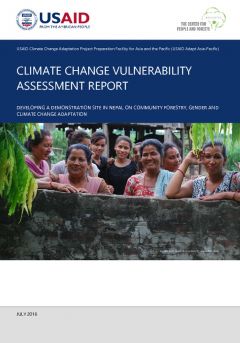Resource information
In this context, RECOFTC and USAID Adapt Asia-Pacific have developed a framework for better understanding and assessing climate change vulnerabilities in a context of multiple competing interests in a CF landscape. The pilot site for developing this approach was a women-led Community Forestry User Group (CFUG) in the Terai of Nepal; the Bishnupur community forest. The context in Bishnupur reflects challenges associated with the ecologically fragile Chure Forest, but also one of growing opportunities for economic development due to the close proximity of the Indian border. The community has served as a valuable, and generous, testing ground for the approach and a continuing pilot site for the implementation of interventions identified through this Vulnerability Assessment process.
The community had demonstrated considerable commitment to the conservation and development of their community forest, while still being impacted on a regular basis by climatic and other natural disasters and growing vulnerabilities heightened by increasingly market-based livelihoods. The project has sought to build on the existing strengths of this women’s group and use the context of growing climatic impacts as an opportunity to test an innovative framework and systematically identify options for responding to associated vulnerabilities. Forestry and local livelihoods do not exist in isolation from other sectors or cross-cutting priorities, and the best practices and learning process documented throughout and the approaches piloted here may be of broader use to the forestry (and adaptation) sector. The framework presented here may be applicable in a range of contexts not limited to community forestry and while further refinement will be undertaken, can serve as the foundation for a broader community-based approach to adapting to climate change.



